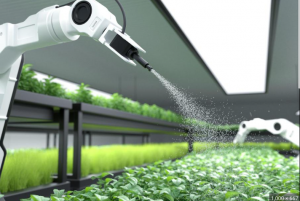AI-Enabled Precision Agriculture: Revolutionizing Farming Practices for Sustainable Food Production
AI-Enabled Precision Agriculture: Revolutionizing Farming Practices for Sustainable Food Production
30 June 2023
Agriculture is undergoing a transformative revolution thanks to the integration of Artificial Intelligence (AI) and Machine Learning (ML) technologies. This synergy is paving the way for precision agriculture, a data-driven approach that enables farmers to optimize resource allocation, increase productivity, and reduce environmental impact. In this blog, we will delve into the world of AI-enabled precision agriculture and explore its benefits, applications, and potential to revolutionize the way we produce food sustainably.One such technology making a profound impact on agriculture is Artificial Intelligence (AI). By combining AI with agriculture, we unlock the potential for precision farming techniques that maximize efficiency, minimize waste, and promote sustainable practices. In this blog, we explore the exciting world of AI-enabled precision agriculture and its transformative effects on the future of food production.
What is Precision Agriculture?
Precision agriculture is a farming management approach that utilizes advanced technologies, including AI and ML, to gather and analyse data about crops, soil, weather conditions, and other factors influencing plant growth. By harnessing this data, farmers can make informed decisions to optimize inputs, such as water, fertilizers, and pesticides, tailored to the specific needs of each crop and field.
Here are some key methodologies used in precision agriculture:
- Remote Sensing and Imaging: AI-powered remote sensing techniques, including satellite imagery and drone-based sensors, provide detailed and real-time data about crop health, growth patterns, and soil conditions. We will explore how these technologies capture and process data, enabling farmers to detect issues like nutrient deficiencies, pests, or diseases at an early stage.

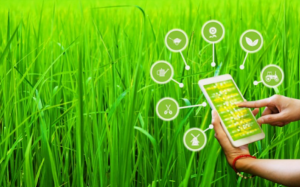
- Predictive Analytics for Yield Forecasting: ML algorithms can analyse historical and real-time data on weather patterns, soil quality, and crop characteristics to generate accurate yield forecasts. This information empowers farmers to make better decisions regarding planting schedules, crop selection, and market predictions.
- Intelligent Irrigation Management: Water scarcity is a critical concern in agriculture. AI algorithms can analyse soil moisture data, weather patterns, and crop water requirements to optimize irrigation schedules and minimize water waste. We will discuss the benefits of AI-enabled smart irrigation systems for conserving water resources and ensuring optimal crop growth.

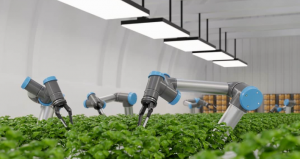
- Crop Monitoring and Disease Detection: AI-based image analysis techniques can monitor crops for signs of diseases, pests, and nutrient deficiencies. Through computer vision algorithms, farmers can detect and diagnose these issues early on, allowing for targeted interventions and reducing the need for excessive pesticide use.
- Autonomous Farming Machinery: AI-powered machinery, such as autonomous tractors and harvesters, equipped with sensors and cameras, can perform precise tasks like planting, spraying, and harvesting with minimal human intervention. We will explore how these technologies enhance efficiency, reduce labour costs, and improve productivity.

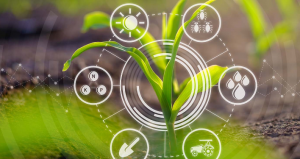
- Data Integration and Decision Support Systems: The integration of AI and ML with farm management software and decision support systems enables farmers to collect, analyse, and interpret vast amounts of data. We will discuss the benefits of these systems in optimizing farm operations, enhancing crop quality, and streamlining overall productivity.
- Automated Weed Detection and Management: Weeds compete with crops for resources, impacting yields and increasing labor costs. AI-powered computer vision systems can identify and differentiate between crop plants and weeds in real time. This allows for the precise application of herbicides, reducing their environmental impact and minimizing damage to crops.

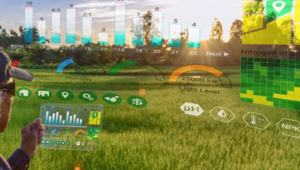
- Robotics and Autonomous Farming: AI-powered robots and autonomous vehicles are revolutionizing farming practices. These machines can perform tasks such as seeding, spraying, and harvesting with precision and efficiency. By leveraging AI’s capabilities, farmers can optimize labor, reduce physical exertion, and achieve higher productivity.
Environmental Impact and Sustainability
Precision agriculture helps minimize environmental impact by reducing the use of water, fertilizers, and pesticides, and promoting sustainable practices. We will highlight how AI-enabled precision agriculture contributes to resource efficiency, biodiversity preservation, and climate change mitigation.
Grand Challenges and Future Directions
While AI-enabled precision agriculture holds great promise, it also faces challenges such as data privacy, interoperability, and accessibility. We will discuss these challenges and explore future directions, including the integration of the Internet of Things (IoT), block chain, and advanced analytics to further enhance precision agriculture practices.
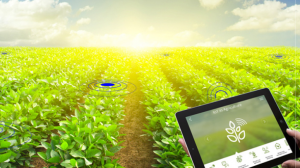

Case Studies and Success Stories
We will showcase real-world examples of AI-enabled precision agriculture implementations from around the globe, highlighting the positive impact on farm productivity, economic returns, and environmental sustainability.
Future Prospects and Challenges
The future of AI-enabled precision agriculture holds immense promise. Advancements in AI algorithms, machine learning, and robotics continue to push the boundaries of what is possible. However, challenges such as data privacy, access to technology in rural areas, and the need for specialized knowledge and training must be addressed to ensure equitable adoption and maximize the benefits for all farmers.
Conclusion
AI-enabled precision agriculture represents a significant leap forward in sustainable farming practices. By harnessing the power of AI and ML, farmers can make data-driven decisions, optimize resource allocation, and mitigate environmental impact. The future of agriculture lies in the hands of intelligent technologies, and precision agriculture is poised to revolutionize the way we grow food, ensuring a sustainable and food-secure future for generations to come.AI-enabled precision agriculture has the potential to transform the way we produce food sustainably. By leveraging the power of AI, farmers can optimize crop management, reduce resource waste, and enhance productivity.


